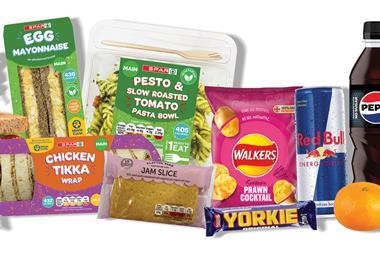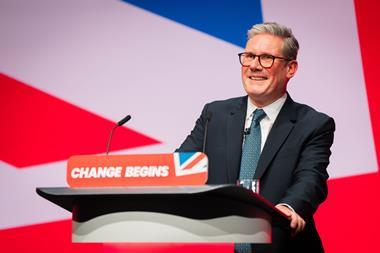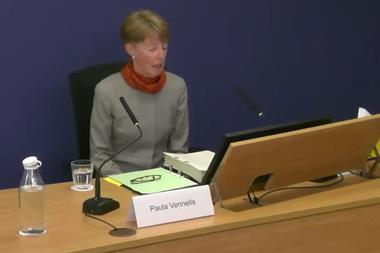When independence is valued as highly as it is in the convenience industry, letting another business into your store takes a leap of faith. However, as a few brave souls have found, teaming up with other companies and even, in some cases, renting out store space, can result in big profits.
For Chris and Sue Sharrinton, who run a Spar store in Helston, Cornwall, linking up with another business, particularly if it’s a well-known brand, has not only led to more profits but has opened up an entire new customer base.
Chris had wanted to do something with the store’s 300sq food-to-go offering for some time, as it had showed little hope of growth. So, with persuasion from his wife Sue, and a trip to see joint operations at work in Northern Ireland, Chris’ store became the first Spar in the South West to link up with a Subway, in July this year. “Subway appealed because it had a young customer base and we felt we were missing that,” he explains.
Chris says that while he would have liked to have taken on the whole operation himself and the profits that came with it - “if I was 15 years younger” - he opted to give the licence to an operator to run the Subway in-store.
“Subway did the refit in three weeks and everything went to plan. We had to close off only a small bit of the store behind the curtain.”
He’s full of praise for the Subway team: “They were really switched on and knew what they were doing. There was no disruption and they even asked if they could bring the big lorries in at four in the morning so as not to disturb the business.”
As part of the negotiations, Chris and Sue stipulated that they wanted to keep some of their existing food-to-go operation, such as the hot pies and pastries. Subway also agreed to sell items such as coffee, crisps and drinks only as part of a meal deal.
Once the operation was up and running, Chris found that the Subway name also helped him secure another branded food-to-go deal. “We’d really wanted a Costa-branded coffee machine, but they’d never been interested. As soon as they found out we were going with Subway they contacted us to see if we’d be interested in one of their Costa Express machines,” Chris points out.
The results of working with Subway, says Chris, have been phenomenal. “It’s one of the best things we’ve ever done. It’s brought in a younger element and footfall has increased by 10%.” He says that about half of people buying Subway also buy something else, and because Subway takes the food-to-go offering into the evening, something which the Sharrintons struggled to do, alcohol sales are up.
Coffee sales have also been transformed, adds Chris. “We’ve gone from £1.49 bean-to-cup coffee to something where the cheapest cup is £2, but seen an increase from about 150 cups to 330 cups per week. It’s all good news.”
It’s a similar story for Cotswold retailer Guy Warner, of Warner’s Budgens. His partnering with renowned Cotswold florists Rose Hamson Flowers has transformed his flower sales, which were previously struggling.
“It was a classic case of having tried every which way to make flowers work in store, but the delivery times and price meant that what we had was, at best, average,” he explains.
Guy felt there was a real need for something different and approached the florist and her team to see if they’d be interested in supplying flowers to the store and looking after the in-store display.
“As with all my partners in-store it starts off with a conversation. I told managing director Rose Hamson that I wanted something that was better than your average supermarket offering. As she’s local she can maintain the displays and really make sure everything is fresh. Like fresh food, having fresh flowers at the front of the store is a big indication to customers what we’re all about.”
Guy first ran a trial to highlight any problems. “A trial lets each give it their best shot and if you find you’re pushing water uphill then that’s probably not a good sign.”
The partnership is run on a kind of gentleman’s agreement and either party can leave at any point, but it’s going so well that neither wants to. “Our flower offering is now 99 times better than before, and sales are up 50-70% over a three-year period,” Guy reveals.
He says that the florist offers an artistic flair that was lacking before, and it really comes to the fore on special occasions. “Around Mother’s Day and Valentine’s our flower display is absolutely stunning,” says Guy.
The display is co-branded with a sign Rose Hamson @ Guy Warners. “The great thing about doing this sort of thing is that it’s unique -you’re not going to get that in your multiple are you?”
Rose, who also works with other retailers under the separate Cotswold Flower Barn brands, isn’t the only business open to partnership opportunities in the c-store sector. For Katrina Hanmer, whose family has owned the Ron Dewdney pasty shop in Devonport for 65 years, the convenience market looked like a perfect match for her product.
Like many companies, it found that future growth would rely on adding value to the existing product, and recognised that involvement with the Spar group could offer just that. So in September this year the dual fascia Spar/Ron Dewdney was opened. The 825sq ft store has two separate fascias - a first for Spar - and the symbol group was keen to accommodate the business needs of the pasty shop. Inside, the store is Spar branded, apart from the Ron Dewdney counter.
In the end, Katrina opted to run both parts of the business herself, but what the Devonport Spar story illustrates is the willingness of the retail market and the symbol groups to embrace the idea of teaming up with others.
Katrina says that she’s hoping that other retailers will collaborate with Ron Dewdney. “If it works I’m hoping to persuade other retailers to have a Ron Dewdney counter in their stores,” she asserts.
So confident is she that she says she plans to open a dual Spar/Ron Dewdney store every year for the next five years.
John Murray of Nisa Local in Dornoch, in the Highlands, was so convinced of the benefits of teaming up with a local butcher with a great reputation that he signed the deal even before his store had been built.
The idea of teaming up with a long-established local butchers in the neighbouring village of Golspie came not long after he bought the site, an old printing works, in November last year. John has been a retailer for 16 years and in that time has bought and sold 14 Nisa Local stores. He put a deal together offering the butcher the chance to rent floorspace within the store.
Negotiations, he says, were easy: “We just agreed a rental price and that I wouldn’t take the profits but that I would always retain the property,” he says.
As the deal, based on a 10-year lease, was struck before work had begun, the businesses agreed that costs of the conversion would be shared. “We each paid for our part of the conversion,” says John. This meant that the 300sq ft of the 1,700sq ft store taken up by the butchers could be modelled exactly how they wanted.
The store opened in March with Gavin’s Traditional Butchers as a separate, but integrated, part of the store. John says that it seems to be working for both sides and he’s so positive about the experience that he’s thinking about doing it again if the right opportunity came along: “I certainly would encourage others to do it,” he asserts.
In an economic climate which is begging businesses to come up with added value, joint ventures could be the way forward.
As Chris Sharrinton says: “You have to look to the bigger picture. It can bring a lot to a store.”
Partnership pointers
Going into business with another company can have its challenges. You may be fortunate, like Guy Warner, to be able to agree terms on a handshake, but deals with major brands, or rental of in-store space, mean you almost certainly need to look at the fine print.
Chris Sharrinton says that any retailer looking to link up needs to examine the deal thoroughly and know what they are getting into: “First, you need to see it in place. Then you’ve got to make sure that it fits your store and does not cut across what you do. And you’ve got to examine whether it’s appropriate and look at room for negotiation.”
Guy advises choosing your partnerships wisely: “You can’t flood your store with them because then you’re in danger of becoming a niche shop and you lose the top-up shop. It’s about using the partnership to balance your offer. You only want to be linked up where you have added value.”




























No comments yet